President of Twitter?
Is social media making it harder for Democrats to nominate a winning candidate?
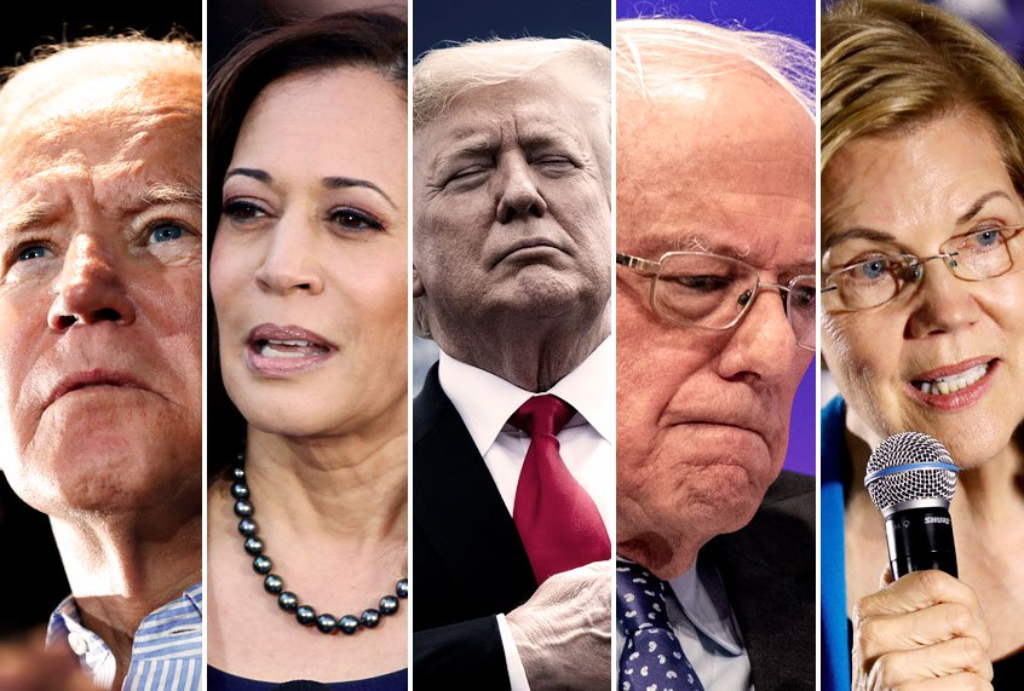
Jonathan Chait wonders, “What If the Only Democrat Who Isn’t Too Radical to Win Is Too Old?” While it rehashes some familiar complaints about the current crop of candidates and concerns about the process, his piece crystallizes them in a useful way.
In the aftermath of the 2016 elections, an exotic political theory promoted by the party’s most left-wing flank suddenly gained wide circulation. The appeal of Bernie Sanders proved Democrats were ready to embrace socialism, or at least something close to it; and Donald Trump’s election proved a nominee with extreme positions could still win. These two conclusions, in combination, suggested the party would move as far left as activists preferred at no political cost.
Neither of these conclusions was actually correct.
He goes on to explain why they’re incorrect and why they were reached in the first place. The short answer to the latter is “Twitter.”
By the beginning of 2019, most of the Democratic field had absorbed this new conventional wisdom. The field was racing left, treating the consensus on progressive Twitter as though it were a simulacrum of the real Democratic Party. On some issues, like a higher minimum wage and more generous Social Security benefits, bold left-wing positions really do capture strong political majorities. But on other issues, many candidates have exposed themselves to damaging general election attacks: on reparations for slavery, decriminalizing the border, and giving health-care coverage to undocumented immigrants, among others.
He points to a widely-tweeted speech line from Kirsten Gillibrand embracing social justice rhetoric as “positioning the candidate to be elected President of Twitter.”
While Chait oversells the degree to which social media is driving all of this, he’s right that there’s a reward system for those who hit the right buzzwords and position themselves correctly. It exists on both the left and the right—Twitter is no place for moderates—but it’s more aggressive on the left, presumably because it pulls from a younger demographic.
Still, the more important driving factor is the sense, driven home by Trump’s unexpected victory in 2016, is that swing voters simply no longer matter. Elections are all about turn-out, which means getting the base excited. That’s probably not true but it’s an understandable takeaway. And, certainly, Trump himself is acting on that belief.
I’m not sure whether either of those explanations covers Chait’s chief complaint:
Nowhere was the gap between perception and reality more dramatic than on health care. In the run-up to the primary, most of the field signed on to Bernie Sanders’s Medicare for All plan. Sanders had not managed to work out solutions to the obstacles that have bedeviled single-payer health-care supporters for decades: How to assure Americans who currently have employer-sponsored insurance to accept higher taxes and that they’ll be happier on a public plan.
Kamala Harris has had second thoughts, and has twisted herself into a pretzel trying to wriggle away from the proposal. Cory Booker has largely avoided discussing it. Elizabeth Warren was signaling last year that she would support more moderate reforms, but has instead handcuffed herself to the Sanders plan.
The vulnerabilities of this position have been on bright display in every Democratic debate. Neither Warren nor Sanders could supply a coherent response to the question of whether middle-class voters would pay higher taxes or whether they would like being moved off their employer plan. “I’ve never met anybody who likes their health-insurance company,” Warren insisted, eliding the clear reality that most people who have employer-sponsored insurance do like it. When asked about higher taxes, they dodged by changing the question to total costs. And while it’s probably true that they could design a plan where higher wages — by taking insurance off the company books — would cancel out the high taxes, neither inspired confidence that they could persuade skeptical voters they’d come out ahead in the deal.
The odd thing about this race to the left is that there’s little evidence it appeals to the primary electorate, let alone the general election version. Democrats strongly support universal coverage, but have lukewarm feelings on the mechanism to attain this. They prefer reforms that involve a combination of public and private options over the Bernie movement’s manic obsession with crushing private health insurance.
This strikes me as a natural result of a crowded primary field. To win the party nomination, candidates need to appeal to the enthusiastic base—which is almost always more ideological than the mainstream of the party, much less uncommitted voters who decide general elections.
Further, while I agree that the Sanders-Warren position (single-payer with the elimination of private carriers altogether) is an extreme one, it’s not the position that’s been leading the field since the campaign began. (A point Chait himself acknowledges; indeed, it’s a premise of the piece.)
“Responding to a Democratic electorate that has been radicalized by Donald Trump and is still smarting from the 2008 recession, Warren and Sanders have yanked the conversation — and the party — sharply to the left,” exults The Nation‘s Jeet Heer, treating the premise that Democratic voters demand a leftward tilt as so self-evident he needn’t bother substantiating it. “Politicians often deemed moderate such as Pete Buttigieg and Kamala Harris have joined the policy arms race, with candidates trying to top one another with their competing plans to remake America.”
The metaphor “policy arms race,” which he borrows from Paul Waldman, is worth lingering over. An arms race is a dynamic in which competitors are forced to devote more of their resources to defense lest they fall behind. It is a negative-sum dynamic, in which both sides are trapped into harmful behavior. Even hawks like Eisenhower, Nixon, and Reagan recognized the inherent dangers of an arms race.
I’m not sold on the analogy, to be honest. I see the various policy proposals more as signaling than anything else. Absent a wave election that gives Democrats the White House and a strong majority in the Senate, none of the more radical plans will actually be passed into law. Even if the fillibuster were removed altogether, Senators in swing states—let alone traditionally red states—are unlikely to vote to eliminate private insurance. But I suppose it’s possible that the candidates themselves and their most ardent supporters believe otherwise.
Regardless, Chait circles back to his opening fear:
. . . Biden’s supporters have a positive appreciation for compromise and pluralism, designing policies that appeal to wide social and economic swaths of the country, rather than those that draw sharp cleavages between winners and losers.
But if Biden has this ideological territory to himself, it raises the possibility he could win the nomination simply because his opponents abandoned the field. What if all his major competition raced to the left, succumbing to the fashionable delusion that the party rank and file demanded a Bernie-like nominee? And what if the only self-styled moderates in the race (Michael Bennet, Amy Klobuchar, John Hickenlooper, and so on) lacked the name recognition to mount a credible challenge?
That’s a distinct possibility. Then again, it’s ever thus. Parties often fail to nominate their best general election candidate. And Bennet, Klobuchar, Hickenlooper were never going to be the nominee. Ditto Gillibrand or Andrew Yang, who were vying for the Progressive vote.
Indeed, two candidates seem to have realized this problem. Kamala Harris and Cory Booker have dropped out of the left-wing arms race and begun positioning themselves as heirs to the Obama style of optimism and uplift. But it’s already getting late, and each candidate has already devoted most of the time between their launch and the Iowa caucuses trying to avoid getting dragged on Twitter. What’s more, the fact that both Harris and Booker are trying to squeeze into the same political space increases the probability that neither will achieve escape velocity.
Again, I’m dubious that Twitter was that much of a factor in Harris or Booker’s positioning. And, frankly, the fact that they’re still scrambling to position themselves ideologically is likely evidence that they weren’t ready to grab the brass ring this go-around.
As a moderate who doesn’t have a home in either political party these days, I feel Chait’s pain. I’d prefer a candidate in their 50s rather than their 70s. I’d prefer someone closer to me ideologically.
I’m intrigued by the likes of Pete Buttigieg and Andrew Yang. But neither is going to get the nomination. And, frankly, despite their intellect and energy, neither has the preparation to be President.
As the race stands now, it’s Biden’s to lose. Warren seems best positioned to take the baton if he continues to stumble. They’re both smart, decent, and likable. I prefer Biden in terms of preparation, ideology, and temperament. I prefer Warren in terms of energy. Either would be a drastic improvement over Trump.

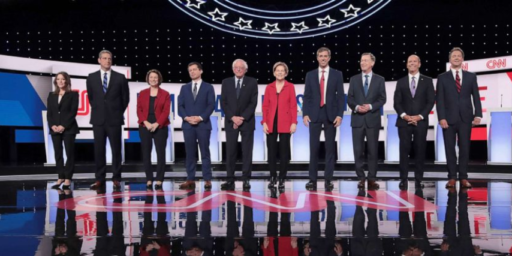
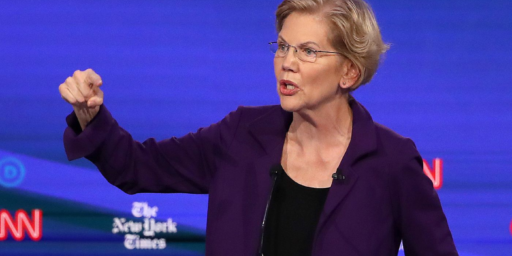
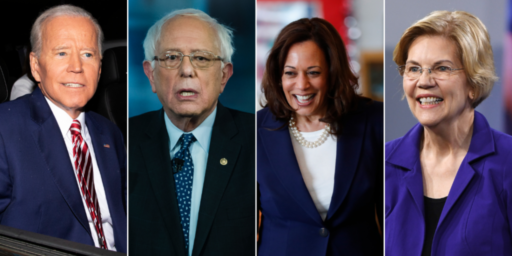
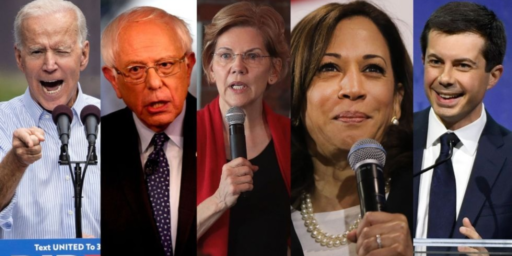
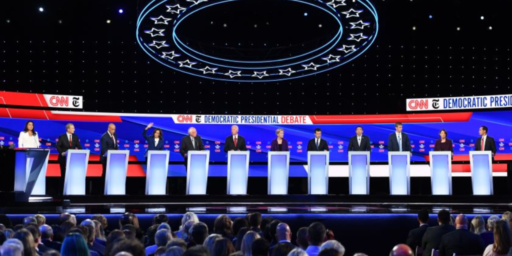
Betteridge’s Law of Headlines
The legacy of Obama’s decency and competency still have legs in today’s political market, as Biden well knows, but the optimism and uplift… Not so much, I think.
Biden gave such a rambling response towards the end that in my mind he disqualified himself- it really was that bad, very Trumpian. I like Harris but Warren really has won me over, yes her view on Medicare is far fetched but it really remains just a platitude. The truth is that most Dems agree mostly on all issues. A democratic administration would be pretty centrist IMO.
Where a winning candidate is defined as one the pundits agree on.
Really James? I mean really? We’ve got trump, the twitter president, and you’re worried how DEMs might be influenced? As far as Chait’s, the DEMs not named Biden being to radical to win, again, trump?
If we lose this election it won’t be because we nominated the wrong candidate, it will be because the majority in this country have become morally bankrupt racist pieces of shit and I suggest that anyone with a soul and the fiscal freedom to do so, leaves.
@OzarkHillbilly: Morally bankrupt racist pieces of shit were probably only half of Trump’s 46%, if we use Hillary’s estimate.
“Jonathan Chait believes Twitter is the biggest obstacle stopping a Biden presidency, thinks Sanders was to the right of Clinton, believes “extreme” candidates can’t win (Trump was a fluke apparently), and other wrong things in this amusing diatribe.”
-Matt Taibbi
@Teve: The more interesting thing to me about the phenomenon is that it might be functioning as a rhetorical convention. Does the headline writer put the question mark there to elicit the “no” response from the reader?
ETA: It’s certainly possible that the other half are people who will vote for anyone with (R) after their name.
@Teve: Yep. The rest of his electoral support will have to come from morally bankrupt PoS who aren’t racist, who just hate everyone equally.
ETA: @Just nutha ignint cracker:
See above.
@OzarkHillbilly: Remember, most people don’t follow politics closely. Yes, if you follow politics closely and you’re still a trump supporter in September of 2019, you’re highly likely to be a garbage human being. But I know a few people who like Trump because they just don’t know any better. While we’re checking charts at RealClearPolitics, they’re catching up on back episodes of The Bachelor.
They’re probably the smart ones. 😀
Republican who dislikes Trump upset Democrats aren’t going to nominate Mitt Romney.
@Teve: Counterpoint: Should you bring a llama to your wedding?
The answer is clearly yes.
@Gustopher:
“Berserk llama syndrome” ftw!!!
James, you say:
But, I’d have you note that those candidates you name closer to you in ideology, (i.e. Biden, Buttigieg, and Yang) have all found a “home” in today’s Democratic Party. Bullock, Delaney and Hickenlooper are all Democrats, too. Even Warren is more moderate than the lazier pundits would have you believe, if your context is American history (rather than the US post-Reagan) and other advanced democracies in the world. Bernie, BTW, is not a Democrat.
There’s plenty of room for you in the Democratic Party. You’re just going to have to let go of your remaining affections for the Republican Party of your youth and recognize that with today’s GOP sitting so far out to the right, the US political center sits in the big tent that is the Dems.
@Scott F.:
Let me expand on that.
If you believe any of the following:
* everyone should have access to health care
* increasing wealth inequity is bad for the US
* blowing up the debt is bad for the US
* no religion should get preferential treatment under the law
* Americans should be able to marry the person they love
* making abortion illegal hurts America more than it helps
* black people should be treated equally under the law
* democracy is important and voting rights should be protected
* education is important, and facts matter
* much of the current financial industry is parasitic on the economy
* global warming is the greatest threat facing the world at the moment
…then the ONLY place for you is the Democratic Party, which is the only organized political group in America that agrees with you and has a nonzero chance to do something about it in your lifetime.
@DrDaveT: It’s a great pity that what you wrote, which is exactly right, isn’t more widely believed and widely spread as the truth by the arbiters of what is supposed to be news in this country…
I find that I disagree in detail with a lot of Warren’s stuff. But yet I like her as a candidate. My main reservation before this all started was her age, but I don’t see anyone younger doing half as well.
What I like about her is, “Corporate America has us by the throat, and we need to fight back!”
Yeah. Did we even manage to get rid of the carried interest exclusion under Obama? What about that terrible, terrible bankruptcy bill that Biden and Clinton both voted for? Why did debt collectors need any help?
I think a full single-payer system is very unlikely to pass Congress, even with strong coattails by the Dem candidate. So I’m not worried about it. It’s more of a slogan, meant to show one’s intentions.
@Teve:
I don’t think much of willfully ignorant people either. That said, there is absolutely no way on Gawd’s green earth they don’t know what a racist piece of shit trump is. Whether they care or not, they are OK with it.
That is on them.
@OzarkHillbilly:
I’m worried they’ll nominate someone who can’t beat Trump.
@Just nutha ignint cracker:
In my case, I tend to put it there when the purpose of the article is to debate a question that has been legitimately raised. In this case, I think Chait is both on to something and yet vastly overstating the phenomenon.
@Scott F.:
As I’ve said before, I’m functionally a Democrat going back to just before the 2016 election. I’ll vote in the Democratic primaries in March. But, whereas was slowly pushed out of a Republican Party for which I had strong affection in my youth, the Democrats have me only be default at this point because Trump has revealed what the GOP has become. I could comfortably vote for Joe Biden or many of the governors who had no chance. I could vote for Warren in good conscience but would hope her policy preferences got reined in considerably by the Congress. Still, I recognize that I’m ideologically at odds with the Democratic base.
@James Joyner:
I’m curious what it is that you think the Democratic base holds as ‘ideology’, yet you disagree with.
That said, who cares what the base believes, if it doesn’t translate into policy and legislation? Are you ideologically at odds with any of the likely Democratic Party platform? (I’m trying to distinguish here between ideological and methodological disagreements.)
@James Joyner:
My point with the “big tent” is that the Democratic base does not dictate the party’s approach to governance and that’s been the case for at least 35 years. The most ideologically leftist legislation out of a Democratic administration in that time was the ACA and Senator Ben Nelson had more to say about the final form of what was signed into law than any member more associated with the base. It simply isn’t the case that the Democrats are in thrall to the fringe of their party like the Republicans are beholden to the radical right.
In the age of Trump, the Republicans are the extremists in their base and they are running the government like that is the case. Even a very strong pull to the left from Warren or Harris would merely pull the Overton Window closer to a moderate center.